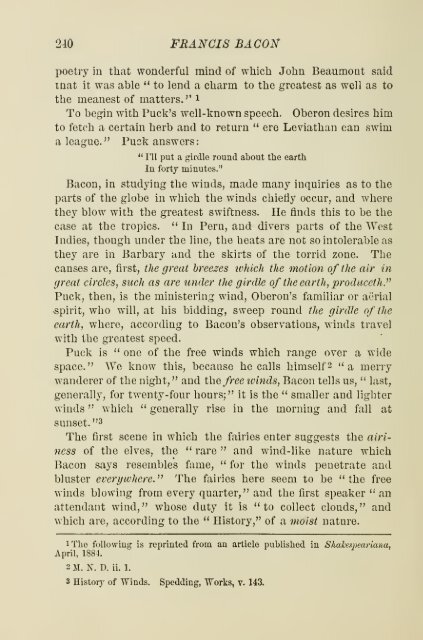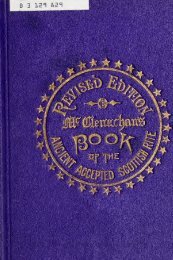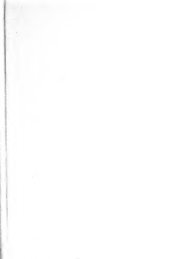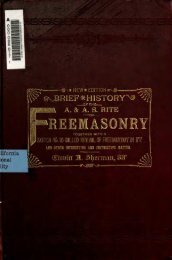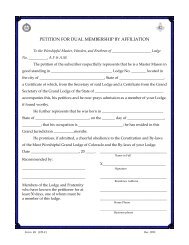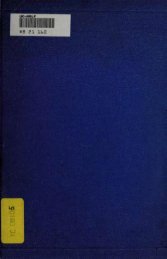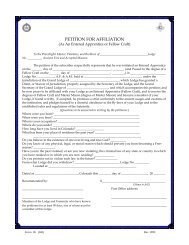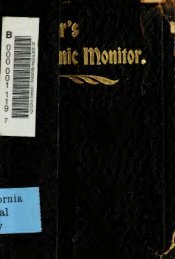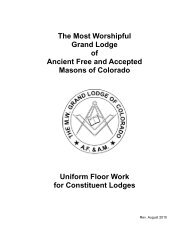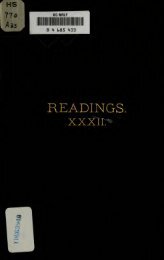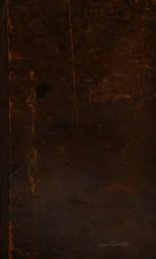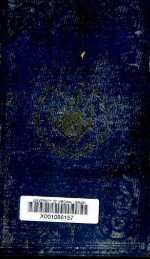- Page 2:
THE LIBRARY OF THE UNIVERSITY OF CA
- Page 7 and 8:
FRANCIS BACON ^D ^SECRET SOCIETY. A
- Page 9:
* TO THE "Young Jit%dlar« txftfp I
- Page 13 and 14:
Feaicis Bacon aid his Seceet Societ
- Page 15 and 16:
AND MIS SECRET SOCIETY. 11 works ar
- Page 17 and 18:
AND HIS SECRET SOCIETY. 13 encourag
- Page 19 and 20:
AND HIS SECRET SOCIETY. 15 their ve
- Page 21 and 22:
AND HIS SECRET SOCIETY. 1? not unde
- Page 23 and 24:
I AND HIS SECHET SOCIETY. 19 help i
- Page 25 and 26:
AND HIS SECRET SOCIETY. 21 Before c
- Page 27 and 28:
AND HIS SECRET SOCIETY. 23 From ide
- Page 29 and 30:
CHAPTEE II. FRANCIS BACON: SOME DOU
- Page 31 and 32:
AND HIS SECRET SOCIETY. 27 works, t
- Page 33 and 34:
" AND HIS SECRET SOCIETY. 29 though
- Page 35 and 36:
AND HIS SNC&ET SOCIETY. 31 whole of
- Page 37 and 38:
AND HIS SECRET SOCIETY. 33 (or perh
- Page 39 and 40:
" AND HIS SECRET SOCIETY. 35 ture,
- Page 41 and 42:
" AND HIS SECRET SOCIETY. 37 native
- Page 43 and 44:
" ; AND HIS SECRET SOCIETY. 39 tile
- Page 45 and 46:
AND HIS SECRET SOCIETY, 41 inunicat
- Page 47 and 48:
AND HIS SECRET SOCIETY. 43 yet Baco
- Page 49 and 50:
AND HIS SECRET S0CIET1 45 the Tenis
- Page 51 and 52:
AND HIS SECRET SOCIETY. 47 of his u
- Page 53 and 54:
" — AND HIS SECRET SOCIETY. 49 la
- Page 55 and 56:
" ANT) HIS SECRET SOCIETY. 51 sleep
- Page 57 and 58:
) ) AND HIS SECRET SOCIETY. 53 who
- Page 59 and 60:
AND HIS SECRET SOCIETY. 55 James. "
- Page 61 and 62:
" AND HIS SECRET SOCIETY. 57 mental
- Page 63 and 64:
" AND HIS SECRET SOCIETY. 59 Carefu
- Page 65 and 66:
AND HIS SECRET SOCIETY. 61 friends,
- Page 67 and 68:
AND HIS SECRET SOCIETY. 63 be prono
- Page 69 and 70:
AND HIS SECRET SOCIETY. 65 whom it
- Page 71 and 72:
) AND HIS SECRET SOCIETY. 67 ance,
- Page 73 and 74:
" AND HIS SECRET SOCIETY. 69 " Baco
- Page 75 and 76:
AXD HIS SECRET SOCIETY. 71 Apologis
- Page 77 and 78:
AND HIS SECRET SOCIETY. 73 " It is
- Page 79 and 80:
" AND HIS SECRET SOCIETY. 75 good s
- Page 81 and 82:
AND HIS SECRET SOCIETY. 77 and the
- Page 83 and 84:
AND HIS SEC11ET SOCIETY. 79 confide
- Page 85 and 86:
" AND HIS SECRET SOCIETY. 81 senten
- Page 87 and 88:
" ' AND HIS SECRET SOCIETY. 83 some
- Page 89 and 90:
" He " AND HIS SECRET SOCIETY. 85 b
- Page 91 and 92:
AND HIS SECRET SOCIETY. 87 with the
- Page 93 and 94:
AND HIS SECRET SOCIETY. 89 actually
- Page 95 and 96:
AND HIS SECRET SOCIETY. 91 So many
- Page 97 and 98:
AND HIS SECRET SOCIETY. 93 sages of
- Page 99 and 100:
AND HIS SECRET SOCIETY. 95 hour of
- Page 101 and 102:
AND HIS SECRET SOCIETY. 97 Egyptian
- Page 103 and 104:
AND HIS SECRET SOCIETY. 99 " Of the
- Page 105 and 106:
AND HIS SECRET SOCIETY. 101 That th
- Page 107 and 108:
AND HIS SECRET SOCIETY. 103 which w
- Page 109 and 110:
AND HIS SECRET SOCIETY. 105 These a
- Page 111 and 112:
AND HIS SECRET SOCIETY. 107 The Mid
- Page 113 and 114:
AND HIS SECRET SOCIETY. 109 have be
- Page 115 and 116:
AND HIS SECRET SOCIETY. Ill after w
- Page 117 and 118:
AND HIS SECRET SOCIETY. 113 Lady An
- Page 119 and 120:
AND HIS SECRET SOCIETY. 115 Without
- Page 121 and 122:
CHAPTER V. PLAYWRIGHT AND POET-PHIL
- Page 123 and 124:
AND HIS SECRET SOCIETY. 119 and nat
- Page 125 and 126:
• acknowledged AND HIS SECBET SOC
- Page 127 and 128:
AND HIS SECRET SOCIETY. 123 ' often
- Page 129 and 130:
But he .writes AND HIS SECRET SOCIE
- Page 131 and 132:
and ultimate catholicity AND MIS SE
- Page 133 and 134:
AND HIS SECRET SOCIETY. 129 the pla
- Page 135 and 136:
AND HIS SECRET SOCIETY. 131 Then fo
- Page 137 and 138:
AND HIS SECRET SOCIETY. 133 felicit
- Page 139 and 140:
To this AND HIS SECEET SOCIETY. 135
- Page 141 and 142:
AND HIS SECRET SOCIETY. 137 " deeds
- Page 143 and 144:
AND HIS SECRET SOCIETY. 139 His obj
- Page 145 and 146:
AND HIS SECRET SOCIETY. 141 There w
- Page 147 and 148:
AND HIS SECRET SOCIETY. 143 next ni
- Page 149 and 150:
AND HIS SECRET SOCIETY. 145 their p
- Page 151 and 152:
AND HIS SEGBET SOCIETY. ' 147 what
- Page 153 and 154:
AND HIS SECRET SOCIETY. 149 without
- Page 155 and 156:
AND HIS SECRET SOCIETY. 151 early d
- Page 157 and 158:
AND HIS SECRET SOCIETY. 153 " I lik
- Page 159 and 160:
AND RIS SECRET SOCIETY. 155 and to
- Page 161 and 162:
AND HIS SECRET SOCIETY. 157 He was
- Page 163 and 164:
AND HIS SECRET SOCIETY. 159 the old
- Page 165 and 166:
AND HIS SECRET SOCIETY. 161 never d
- Page 167 and 168:
AND HIS SECRET SOCIETY. 163 many of
- Page 169 and 170:
AND HIS SECRET SOCIETY. 165 of men
- Page 171 and 172:
AND HIS SECRET SOCIETY. 167 doubtfu
- Page 173 and 174:
AND HIS SECRET SOCIETY. 169 most of
- Page 175 and 176:
AND HIS SECRET SOCIETY. 171 Rosicru
- Page 177 and 178:
AND HIS SECRET SOCIETY. 173 the spe
- Page 179 and 180:
AND HIS SECRET SOCIETY. 175 Civil h
- Page 181 and 182:
AND HIS SECRET SOCIETY. 177 celled,
- Page 183 and 184:
, AND HIS SECRET SOCIETY. 179 ment
- Page 185 and 186:
AND HIS SECRET SOCIETY. 181 learned
- Page 187 and 188:
AND HIS SECRET SOCIETY. 183 centuri
- Page 189 and 190:
AND HIS SECRET SOCIETY. 185 that "
- Page 191 and 192:
AND HIS SECRET SOCIETY. 187 " Natur
- Page 193 and 194: AND HIS SECRET SOCIETY. 189 delight
- Page 195 and 196: AND HIS SECRET SOCIETY. 191 voice a
- Page 197 and 198: AND HIS SECRET SOCIETY. 193 lirfht
- Page 199 and 200: AND HIS SECRET SOCIETY. 195 A vast
- Page 201 and 202: CHAPTER VII. THE ROSICRUCTANS : THE
- Page 203 and 204: AND HIS SECRET SOCIETY. 199 realms
- Page 205 and 206: AND HIS SECRET SOCIETY. 201 the tru
- Page 207 and 208: AND HIS SECRET SOCIETY. 203 science
- Page 209 and 210: AND HIS SECRET SOCIETY. 205 from wh
- Page 211 and 212: AND HIS SECRET SOCIETY. 207 of Rosi
- Page 213 and 214: AND HIS SECRET SOCIETY. 209 men; ye
- Page 215 and 216: AND His SECRET SOCIETY. 211 laid up
- Page 217 and 218: AND HIS SECRET SOCIETY. 213 tency o
- Page 219 and 220: ' AND HIS SECRET SOCIETY. 215 « I
- Page 221 and 222: AND HIS SECRET SOCIETY. 217 17. The
- Page 223 and 224: AND HIS SECRET SOCIETY. 219 ing to
- Page 225 and 226: AND MIS SECRET SOCIETY. 221 Rules 8
- Page 227 and 228: AND HIS SECRET SOCIETY. 223 and doi
- Page 229 and 230: AND HIS SECRET SOCIETY. 225 their o
- Page 231 and 232: AND HIS SECRET SOCIETY. 229 ably be
- Page 233 and 234: AND HIS SECRET SOCIETY. 231 which c
- Page 235 and 236: AND HIS SECRET SOCIETY. 233 that by
- Page 237 and 238: AND HIS SECRET SOCIETY. 235 can, ma
- Page 239 and 240: swords letc AND HIS SECRET SOCIETY.
- Page 241 and 242: AND HIS SECRET SOCIETY. 239 chains,
- Page 243: AND HIS SECRET SOCIETY. 239 chains,
- Page 247 and 248: AND HIS SECRET SOCIETY. 243 careful
- Page 249 and 250: AND HIS SECRET SOCIETY. 245 forth a
- Page 251 and 252: AND HIS SECRET SOCIETY. 247 air, va
- Page 253 and 254: AND HIS SECRET SOCIETY. 249 lent wh
- Page 255 and 256: AND HIS SECRET SOCIETY 251 attendan
- Page 257 and 258: AND HIS SECRET SOCIETY. 253 moonlig
- Page 259 and 260: AND HIS SECRET SOCIETY. 255 days. L
- Page 261 and 262: AND HIS SECRET SOCIETY. 257 The Ros
- Page 263 and 264: AND HIS SECRET SOCIETY. 259 that "
- Page 265 and 266: Prince of Rose-Croix AND HIS SECRET
- Page 267 and 268: AND HIS SECRET SOCIETY. 263 Rose Cr
- Page 269 and 270: AND HIS SECRET SOCIETY. 265 " Freem
- Page 271 and 272: AND HIS SECBET SOCIETY. 267 the cor
- Page 273 and 274: AND HIS SECHET SOCIETY. 269 acknowl
- Page 275 and 276: AND HIS SECRET SOCIETY. 271 it is s
- Page 277 and 278: AND HIS SECBET SOCIETY. 273 Next we
- Page 279 and 280: AND HIS SECRET SOCIETY. 275 which F
- Page 281 and 282: AND HIS SECBET SOCIETY. 277 life re
- Page 283 and 284: AND HIS SECRET SOCIETY. 279 Unhappi
- Page 285 and 286: AND HIS SECRET SOCIETY. 281 truths
- Page 287 and 288: AND HIS SECRET SOCIETY. 283 upon th
- Page 289 and 290: AND HIS SECUE T SOCIETY. 285 into t
- Page 291 and 292: AND HIS SECUET SOCIETY. 287 Solomon
- Page 293 and 294: AND HIS SECRET SOCIETY. 289 In answ
- Page 295 and 296:
AND HIS SECRET SOCIETY. 291 that th
- Page 297 and 298:
AND HIS SECRET SOCIETY. 293 against
- Page 299 and 300:
AND HIS SECRET SOCIETY. 295 ment »
- Page 301 and 302:
AND HIS SECRET SOCIETY. 297 of his
- Page 303 and 304:
AND HIS SECRET SOCIETY. 299 his sub
- Page 305 and 306:
, evidently AND HIS SECHET SOCIETY.
- Page 307 and 308:
AND HIS SECRET SOCIETY. 303 to be h
- Page 309 and 310:
AND HIS SECRET SOCIETY. 305 4. That
- Page 311 and 312:
AND HIS SECRET SOCIETY. 307 a momen
- Page 313 and 314:
AND HIS SECRET SOCIETY. 309 than Si
- Page 315 and 316:
AND HIS SECRET SOCIETY. 311 saying
- Page 317 and 318:
AXD HIS SECRET SOCIETY. 313 age, I
- Page 319 and 320:
AND HIS SECRET SOCIETY. 315 did not
- Page 321 and 322:
AND HIS SECRET SOCIETY. 317 ception
- Page 323 and 324:
AXD 1I1S SECRET SOCIETY. 319 with h
- Page 325 and 326:
AND HIS SECRET SOCIETY. 321 la the
- Page 327 and 328:
AND HIS SECRET SOCIETY. 323 wood-cu
- Page 329 and 330:
AND HIS SECRET SOCIETY. 325 He is e
- Page 331 and 332:
AND HIS SECRET SOCIETY. 327 edge un
- Page 333 and 334:
AND HIS SECRET SOCIETY. 329 The tex
- Page 335 and 336:
AND HIS SECRET SOCIETY. 331 amongst
- Page 337 and 338:
AND HIS SECBET SOCIETY. 333 immense
- Page 339 and 340:
CHAPTER XI. PAPER-MARKS IN AND AFTE
- Page 341 and 342:
AND HIS SECRET SOCIETY. 33? These w
- Page 343 and 344:
AND MIS SECRET SOCIETY. 330 Light s
- Page 345 and 346:
AND HIS SECRET SOCIETY. 341 institu
- Page 347 and 348:
AND HIS SECRET SOCIETY. 343 ble min
- Page 349 and 350:
AND HIS SECRET SOCIETY. 345 surmoun
- Page 351 and 352:
AND HIS SECRET SOCIETY. 347 Plate X
- Page 353 and 354:
AND HIS SEGUET SOCIETY. 349 « All
- Page 355 and 356:
AND HIS SECRET SOCIETY. 351 Degree"
- Page 357 and 358:
AND HIS SECRET SOCIETY. 353 Israeli
- Page 359 and 360:
AND HIS SECRET SOCIETY. 355 airy an
- Page 361 and 362:
heat. AND HIS SECRET SOCIETY. 357 T
- Page 363 and 364:
AND HIS SECRET SOCIETY. 359 « mere
- Page 365 and 366:
AND HIS SECRET SOCIETY. 361 dlestic
- Page 367 and 368:
AND HIS SECRET SOCIETY. 363 play. I
- Page 369 and 370:
AND HIS SECHET SOCIETY. 365 8. What
- Page 371 and 372:
AND HTS SECRET SOCIETY. 367 the ran
- Page 373 and 374:
AND HIS SECRET SOCIETY. 369 " The f
- Page 375 and 376:
AND HIS SECRET SOCIETY. 371 at all,
- Page 377 and 378:
AND HIS SECRET SOCIETY. 373 trusts
- Page 379 and 380:
Plate I. from. NSS.
- Page 381:
Put. in ^ osr®
- Page 384:
w.h.izr RLUKMB) . Snw^TT) g\A\A M (
- Page 387 and 388:
ft Ai lb^
- Page 389 and 390:
Plafe 2E.
- Page 391 and 392:
TUte 2nr. tru* _ JOO ooooo oooo ego
- Page 393 and 394:
Plate 23.
- Page 395 and 396:
Plafe 3331.
- Page 397 and 398:
Plafc 2H.
- Page 399 and 400:
Plate 2ZT.
- Page 401 and 402:
Put* sun
- Page 403 and 404:
Plafe XW
- Page 405:
Piatt 2X2H
- Page 408 and 409:
404 FBA NCIS BA CON for the Deity,
- Page 410 and 411:
406 FRANCIS BACON 12. Bull's head.
- Page 412 and 413:
408 FEANC1S BACON 13. Fool's cap. B
- Page 414 and 415:
— 410 FRA NCIS BA CON 12, 13. Fle
- Page 416 and 417:
412 FRANCIS BACON Plate X. 24,25. D
- Page 418 and 419:
414 FRANCIS BACON 90, 91. Paradise
- Page 420 and 421:
416 FBANCIS BACON 10. Note : This i
- Page 422 and 423:
418 FRA NGIS BA CON Plate XXIV. 1-1
- Page 424 and 425:
420 FRANCIS BACON (nearly 5 inches)
- Page 430 and 431:
vmvmsm of cau FORN m „brary Los A


